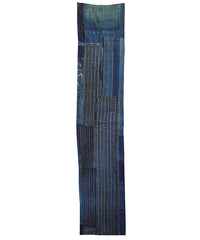A 19th Century Boro Panel: Katazome and Many Patches
ca. mid to late nineteenth century
64" x 13", 162.5 cm x 33 cm
Please make sure to view all the photos of this fantastic, old boro cloth--the reason is that this indigo dyed cotton panel from a futon cover is equally interesting on both its sides.
The proper inside of this patched and stitched panel shows a great deal of just that: layers of patching and stitching. And it is beautifully done, and is quite dense in mending and rich in stitching.
The back of this cloth--or what would have been its proper outside--is a simply beautiful example of katazome or stencil resist dyed cloth. The pattern which is shown is complex: it is a combination of arabesque (or karakusa) and roundels showing pine, bamboo and plum blossoms, the combination of design motives being called shochikubai in Japan.
Shochikubai is a classic, auspicious pattern and it is often used for cloth to be included in a bridal trousseau. The plum is the first bloom to burst forth from the winter's ice and is symbol of strength, the bamboo bends but does not break so it is a symbol of resilience, and the pine, of course conveys a wish for longevity. Also, pine needles fall in pairs, and thus they are a motif often used at weddings.
The hand spun, hand loomed cotton of this katazome cloth is just fantastic; the fading and oxidation to the image, as well, is lovely. There appears to be some very, very faded touches of benibana or safflower dye that can be detected in this design--benibana yields an orange-red color and is light fugitive.
A fantastic length of old, boro cloth.Very recommended.

